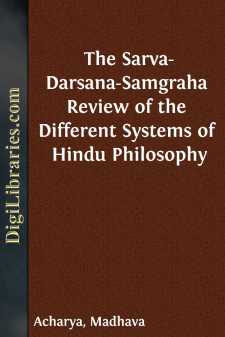Categories
- Antiques & Collectibles 13
- Architecture 36
- Art 48
- Bibles 22
- Biography & Autobiography 813
- Body, Mind & Spirit 142
- Business & Economics 28
- Children's Books 15
- Children's Fiction 12
- Computers 4
- Cooking 94
- Crafts & Hobbies 4
- Drama 346
- Education 46
- Family & Relationships 57
- Fiction 11828
- Games 19
- Gardening 17
- Health & Fitness 34
- History 1377
- House & Home 1
- Humor 147
- Juvenile Fiction 1873
- Juvenile Nonfiction 202
- Language Arts & Disciplines 88
- Law 16
- Literary Collections 686
- Literary Criticism 179
- Mathematics 13
- Medical 41
- Music 40
- Nature 179
- Non-Classifiable 1768
- Performing Arts 7
- Periodicals 1453
- Philosophy 64
- Photography 2
- Poetry 896
- Political Science 203
- Psychology 42
- Reference 154
- Religion 513
- Science 126
- Self-Help 84
- Social Science 81
- Sports & Recreation 34
- Study Aids 3
- Technology & Engineering 59
- Transportation 23
- Travel 463
- True Crime 29
The Sarva-Darsana-Samgraha Review of the Different Systems of Hindu Philosophy
by: Madhava Acharya
Description:
Excerpt
PREFACE.
I well remember the interest excited among the learned Hindus of Calcutta by the publication of the Sarva-darà âºana-saá¹Ægraha of Mádhava Áchárya in the Bibliotheca Indica in 1858. It was originally edited by Paá¹â¡Ã¡Â¸Âit Íà âºvarachandra Vidyáságara, but a subsequent edition, with no important alterations, was published in 1872 by Paá¹â¡Ã¡Â¸Âit Táránátha Tarkaváchaspati. The work had been used by Wilson in his "Sketch of the Religious Sects of the Hindus" (first published in the Asiatic Researches, vol. xvi., Calcutta, 1828); but it does not appear to have been ever much known in India. MS. copies of it are very scarce; and those found in the North of India, as far as I have had an opportunity of examining them, seem to be all derived from one copy, brought originally from the South, and therefore written in the Telugu character. Certain mistakes are found in all alike, and probably arose from some illegible readings in the old Telugu original. I have noticed the same thing in the Nágarà copies of Mádhava's Commentary on the Black Yajur Veda, which are current in the North of India.
As I was at that time the Oriental Secretary of the Bengal Asiatic Society, I was naturally attracted to the book; and I subsequently read it with my friend Paá¹â¡Ã¡Â¸Âit Maheà âºachandra Nyáyaratna, the present Principal of the Sanskrit College at Calcutta. I always hoped to translate it into English; but I was continually prevented by other engagements while I remained in India. Soon after my return to England, I tried to carry out my intention; but I found that several chapters, to which I had not paid the same attention as to the rest, were too difficult to be translated in England, where I could no longer enjoy the advantage of reference to my old friends the Paá¹â¡Ã¡Â¸Âits of the Sanskrit College. In despair I laid my translation aside for years, until I happened to learn that my friend, Mr. A. E. Gough, at that time a Professor in the Sanskrit College at Benares, was thinking of translating the book. I at once proposed to him that we should do it together, and he kindly consented to my proposal; and we accordingly each undertook certain chapters of the work. He had the advantage of the help of some of the Paá¹â¡Ã¡Â¸Âits of Benares, especially of Paá¹â¡Ã¡Â¸Âit Ráma Mià âºra, the assistant Professor of Sáá¹â¦khya, who was himself a Rámánuja; and I trust that, though we have doubtless left some things unexplained or explained wrongly, we may have been able to throw light on many of the dark sayings with which the original abounds. Our translations were originally published at intervals in the Benares Paá¹â¡Ã¡Â¸Âit between 1874 and 1878; but they have been carefully revised for their present republication.
The work itself is an interesting specimen of Hindu critical ability. The author successively passes in review the sixteen philosophical systems current in the fourteenth century in the South of India, and gives what appeared to him to be their most important tenets, and the principal arguments by which their followers endeavoured to maintain them; and he often displays some quaint humour as he throws himself for the time into the position of their advocate, and holds, as it were, a temporary brief in behalf of opinions entirely at variance with his own. We may sometimes differ from him in his judgment of the relative importance of their doctrines, but it is always interesting to see the point of view of an acute native critic....


